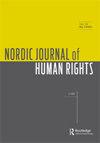From the Vantage Point of Vulnerability Theory: Algorithmic Decision-Making and Access to the European Court of Human Rights
IF 1.2
Q3 POLITICAL SCIENCE
引用次数: 2
Abstract
ABSTRACT The past two decades at the European Court of Human Rights have been marked by various efforts to reduce its backlog of cases through changing the substantive, procedural, and formal practices surrounding access to the Court. Proposals aimed at facilitating these efforts have also rested on the unarticulated premise that solving the ECtHR's backlog problem necessarily involves an either-or choice between improving the Court's efficiency and shrinking individual access to it. This article departs from that premise. Drawing on Martha Fineman's ‘theory of vulnerability’ and her vision for social justice, the article lays out a proposal that allows for the coexistence of efficiency and individual access through a hybrid decision-making (HDM) model. First, we show that from a vulnerability theory perspective, better access to human rights courts is a key component of a just human rights system. Second, we argue that in order to be just, procedures need to be context-sensitive and adopted in ways that acknowledge humans' inherent vulnerability. To support the argument, we draw inspiration from the African Court on Human and Peoples' Rights, whose current practices help illustrate the point that more equitable access to justice need not be a relic of the past.从脆弱性理论的角度:算法决策和进入欧洲人权法院
在过去的二十年中,欧洲人权法院做出了各种努力,通过改变有关进入法院的实质性、程序性和正式做法来减少案件积压。旨在促进这些努力的建议也建立在一个没有明确说明的前提之上,即解决欧洲人权法院的积压问题必然涉及在提高法院效率和减少个人利用法院之间作出非此即彼的选择。这篇文章背离了这个前提。借鉴玛莎·费曼(Martha Fineman)的“脆弱性理论”和她对社会正义的愿景,文章提出了一个建议,通过混合决策(HDM)模型,允许效率和个人访问共存。首先,从脆弱性理论的角度来看,更好地诉诸人权法院是公正的人权制度的关键组成部分。其次,我们认为,为了做到公正,程序需要对环境敏感,并以承认人类固有脆弱性的方式采用。为了支持这一论点,我们从非洲人权和人民权利法院得到启发,该法院目前的做法有助于说明,更公平的诉诸司法的机会不一定是过去的遗物。
本文章由计算机程序翻译,如有差异,请以英文原文为准。
求助全文
约1分钟内获得全文
求助全文
来源期刊

Nordic Journal of Human Rights
POLITICAL SCIENCE-
CiteScore
1.00
自引率
25.00%
发文量
29
期刊介绍:
The Nordic Journal of Human Rights is the Nordic countries’ leading forum for analyses, debate and information about human rights. The Journal’s aim is to provide a cutting-edge forum for international academic critique and analysis in the field of human rights. The Journal takes a broad view of human rights, and wishes to publish high quality and cross-disciplinary analyses and comments on the past, current and future status of human rights for profound collective reflection. It was first issued in 1982 and is published by the Norwegian Centre for Human Rights at the University of Oslo in collaboration with Nordic research centres for human rights.
 求助内容:
求助内容: 应助结果提醒方式:
应助结果提醒方式:


